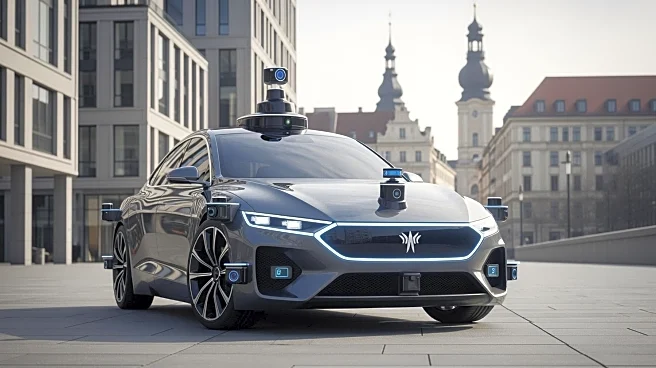What's Happening?
Stellantis, formerly known as FCA US, is partnering with Chinese autonomous driving company Pony.ai to test self-driving taxis in Europe. The pilot operations will begin in Luxembourg in the coming months,
with plans to expand to other European cities by 2026. Under the agreement, Pony.ai will provide its proprietary autonomous driving software, while Stellantis will supply electric vehicles, starting with the Peugeot e-Traveller. The collaboration aims to integrate Pony.ai's technology into Stellantis' light commercial vehicles, focusing on early-stage testing on public roads to meet safety and regulatory standards. This partnership aligns with Stellantis' commitment to advancing mobility solutions through technology collaboration.
Why It's Important?
The collaboration between Stellantis and Pony.ai is significant as it marks a strategic move into the growing autonomous mobility market in Europe. For Stellantis, this partnership represents an opportunity to leverage advanced technology to enhance its vehicle offerings and establish a presence in the autonomous driving sector. Pony.ai, on the other hand, is expanding its robotaxi services beyond China, aiming to gain early regulatory and operational experience in diverse markets. This move is part of a broader industry trend, with companies like Waymo also testing robotaxis internationally, highlighting the competitive race to deploy autonomous mobility solutions at scale.
What's Next?
The next steps involve the commencement of pilot operations in Luxembourg, followed by expansion to other European cities by 2026. As the collaboration progresses, both companies will focus on integrating autonomous technology into Stellantis' vehicles and conducting tests to ensure compliance with safety and regulatory standards. The success of these operations could pave the way for further expansion and adoption of autonomous taxis across Europe, potentially influencing regulatory frameworks and consumer acceptance of self-driving technology.
Beyond the Headlines
The partnership between Stellantis and Pony.ai could have long-term implications for the automotive industry, particularly in terms of technological innovation and regulatory adaptation. As autonomous driving technology becomes more prevalent, there may be shifts in public policy and infrastructure development to accommodate these vehicles. Additionally, ethical considerations regarding safety and data privacy will likely become more prominent as autonomous vehicles gain traction.










